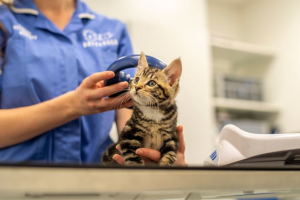
From 10th June 2024, it will become compulsory for all cats in England to be microchipped.
You will be given 21 days to get your cat chipped or face a fine of up to £500 if you don’t comply.
As well as being a legal requirement, microchipping gives your cat the best chance of being identified and returned to you if they go missing or are stolen.
Microchips are safe, quick and easy to implant and effective.
Microchipping cats is a very simple procedure, but something that should only be performed by a vet or suitably trained person.
A small chip, which is the size of a grain of rice, is implanted using a special device in the skin of your cat’s neck, between the shoulder blades.
The chip contains a unique code, individual to your cat.
The details of the microchip will be officially registered by us with an approved microchip database, which will hold up-to-date information about you and your cat.
Cats will need to be microchipped and registered with their keepers’ contact details.
All keepers, including breeders, must keep these details up-to-date.
The only exemption from the requirement is where a vet has certified in writing that a cat is unfit to be microchipped.
Why is microchipping cats necessary?
A microchip makes it much easier to reunite a lost or injured cat with its owner.
Microchipping will reduce the burden on animal charities and local authorities and help protect the welfare of cats by promoting responsible cat ownership.
When a missing cat is found, an animal professional (for example a vet, the RSPCA or Cats Protection) will scan the pet revealing the microchip’s unique 15 digit code, and contact the microchip database your pet is registered with.
The microchip data base company will then perform some security checks before releasing your contact details to the animal professional – so that your cat can be safely reunited with you.
Another benefit is that unlike collars and ID tags, microchips don’t come off and they don’t pose a risk of injury like collars can, by getting caught on things outside.
When to microchip your cat?
Microchipping can be performed with the first vaccination in kittens, and although we use “mini” versions for cats, they can be a bit wriggly at 9 weeks old!
Most people tend to wait until neutering as generally cats are kept indoors until then.
We can implant the chip while your cat is under anaesthetic for spaying or castration.
That way, they won’t feel it being implanted.
Thermochips At Claro Hill Vets
We have chosen to use the HomeAgain Thermochips.
These work in the same way as any other classical pet identification microchip but they have the additional capability of being able to check your pet’s temperature.
It has an integrated temperature biosensor, which makes it possible to collect measurements of their subcutaneous temperature at the location of the chip, using a microchip scanner.
The Thermochip can measure temperature in the ranges of 33 – 43°C.
Although the temperature read is usually slightly lower than rectal temperature, multiple temperature values collected consecutively or regularly (during the daytime for several days, in the early morning and/or in the late evening) can establish a trend for an individual animal’s profile and daily variations.
This is particularly helpful for hospitalised patients and avoids having to stress the patient by using a thermometer up their bottom!
What if I choose not to microchip my cat?
Basically, from June 2024, you will be breaking the law!
If a cat without a microchip comes to the attention of the authorities, its keeper may be served with a notice requiring the cat to be chipped, and may face criminal prosecution and a fine of £500 if they do not comply with the notice.
To book in for your cat to be microchipped, please call Claro Hill Vets on 01423 228080 or visit www.clarohillvets.co.uk.
The microchips are also included in our Pet Health Plans for puppies and kittens.













